In a densely settled Honolulu neighborhood, a Jamaican man and a man originally from New Jersey are spending the afternoon on their hands and knees harvesting `olena, sugarcane and bananas. This unlikely duo is working together to promote sustainability in a way that is relevant to modern society.
Fair-skinned with a beautiful Canon camera slung across his chest, Evan Tector does not look like a farmer. His quick speech and concise vocabulary seems more fit for a technology boardroom than a backyard.Yet, between the tightly packed rows of houses in Pālolo Valley, Tector’s home stands out as an oasis of green among slabs of concrete. His selection of more than 30 fruits, vegetables and herbs would make a supermarket proud. `Olena, the Hawaiian name for turmeric, stand in a neat row next to the leafy potato shoots. Ten-foot tall sugarcane stalks soak up the rain spewed forth from the neighbor’s gutter. Oregano scales the hill, while squash, peppermint, kale, potatoes, Thai basil and spearmint spring up in the shade beside the chicken coop.
But gardening in the middle of a city is not always easy.
“I’m just a mad scientist,” says Tector laughing as he throws away some failed tomato plants. “I experiment. You only see here what I haven’t killed and what the bugs didn’t get.”
To create the proper planting conditions, Tector imported nine metric tons of compost, mulch and horse stable cleanings to his property to create a recipe for soil. Over the course of a year he also introduced a bacterial culture and a myco-rhizome treatment to optimize nutrient uptake for the plants.
“The best defense against insects is to have very healthy plants,” Tector emphasized. “Good soil is the key to healthy plants. So soil is most important.”
Since Tector does not use pesticides or non-organic fertilizers, he also uses “sacrificial plants,” to divert or stall bugs on the perimeter. He says a person should expect to lose about 10% or more of the plants to bugs, fungus or molds even under the best conditions.
In order to create “a closed loop system,” his household composts everything except meat and fish (as they tend to be odorous in an urban environment). Tector says that his three-person household only creates one small or medium size garbage bag of waste per week.
“The key to sustainability is having a renewable source where you don’t have to input fertilizers or have to buy feed or seed for chickens and fish,” he says. The premium compost goes to a collection of worms. The rest is put in wire bins where soldier flies break down the matter and yields a source of protein for the chickens. While Tector says it’s unlikely one can grow all their own food on an average household lot, he supplements 20% of his food needs (with a goal of 40-50%) with produce from his yard and eggs from his chickens.
“This is really about retraining ourselves to find some kind of balance even in these suburban and quasi-urban environments,” says Tector, who is the director of the nonprofit organization Forward Foundation. “We have to get off the consumer, processed, imported, shipped-all-over the world kind of thing. We’re basically relearning everything our grandparents knew.”
Tector credits Jamaican native turned sustainability guru Jeremai Cann as his mentor and the brain of their sustainability project. Cann has a child-like excitement when it comes to gardening. He shucks a stalk of sugarcane by hand, then smiles as he demonstrates how to remove the tough burgundy-colored outer layer with his teeth.
“In Jamaica, this was your toothbrush,” he said while chewing on the fibrous inner stalk.
His dark skin nearly matches the rich brown soil as he touches everything around him; he picks up lizards, digs up worms and rummages through the compost pile. Cann smiles often and seems to enjoy giving out tidbits of knowledge.
“People call me Dr. Sustainability,” said Cann, who lives in a house completely off the power and water grid. “The truest sense of what a doctor was, is teaching. Not as medical, but spiritual. To feed your spirituality, to feed you physically, that’s a kind of knowledge.”
Growing up in Jamaica, Cann learned from a very young age how to conserve water, grow his own food and make fuel. Cann spoke in low, melodic tones recalling his childhood:
Literally at one point in life we would load up our van with five barrels of water. That five barrels would last a family of four, eight dogs, laundry, chickens, for a week….It was extreme water conservation.
When his father’s business was destroyed in territorial violence, Cann says he was able to choose his own path. He became a pre-vet major because he loved animals. After obtaining his degree, Cann realized he disliked hospitals–but still loved animals–so decided to go into the environmental field. It was a step he feels was natural given his childhood.
“I thought, ‘I must have had that experience for a reason,” shared Cann. “So sustainability really became a way to describe what I’m inspired by. I’m inspired by sustainability.”
He worked as an EPA-type inspector in south Florida investigating spills and complaints for six years. “Crime fighting,” he called it with a grin.
“It makes me feel alive,” Cann says. “And that’s why we do it; we’re inspired to keep growing food organically whereby we don’t have to purchase anything.
Not having local sources of food is large motivation for both of these men. The thought that–if shipments were ever interrupted–the food supply in Hawaii would only last about one week made them feel that communities need to have immediate alternatives. According to Cann and Tector, learning sustainable urban agriculture and sharing knowledge, plant stocks, seeds and farming resources with neighbors is one feasible solution.
As much as Evan Tector has his hands in the dirt, he also has a head for politics. In his latest project, Tector was the creative consultant for slack key guitarist Makana’s recent protest song video “We Are The Many” which was performed at the APEC President’s Dinner and went viral the next day.
Cann, also an activist, echos the sentiments in his own words. “Can we switch the corporate structure to a love love love structure?” Cann asks. “Where the innate function is to propagate that love, happy constructive jobs. You can still do what you’re doing, just add a little love to it. Occupy With Aloha is a wonderful example. Aloha means love. So Occupy with Love, we can all do that.”
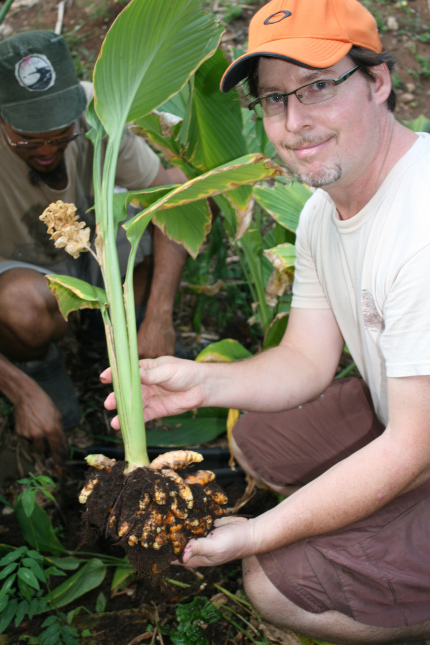
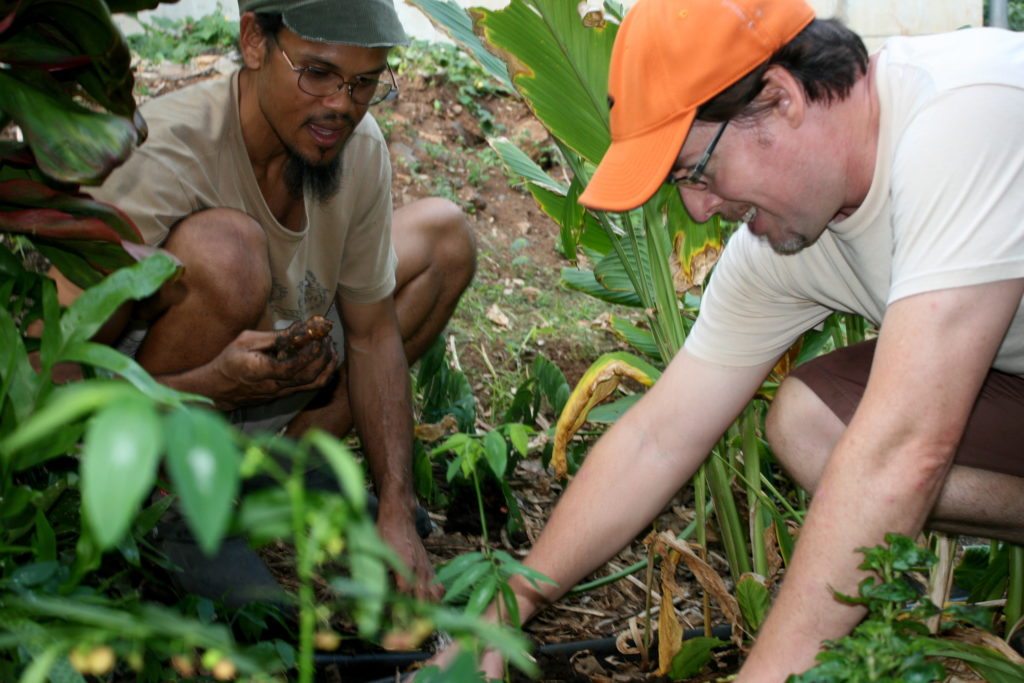
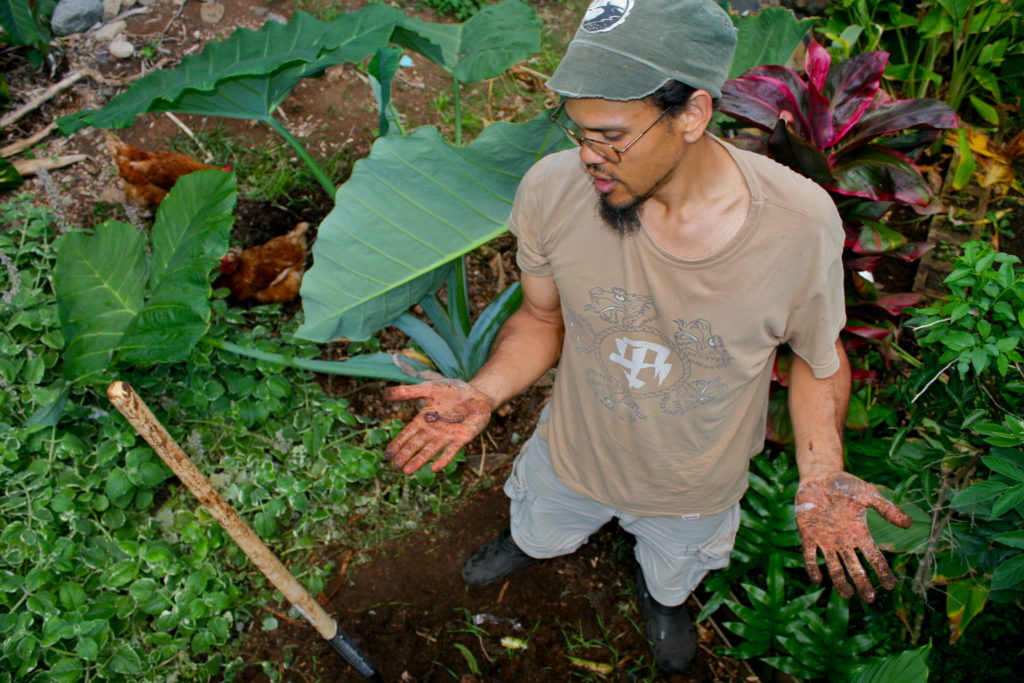

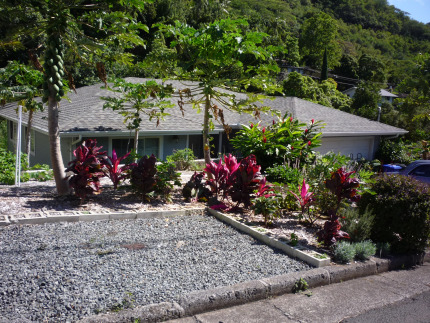
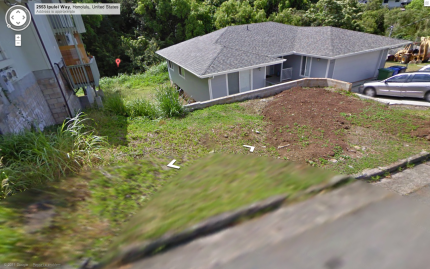
comments +